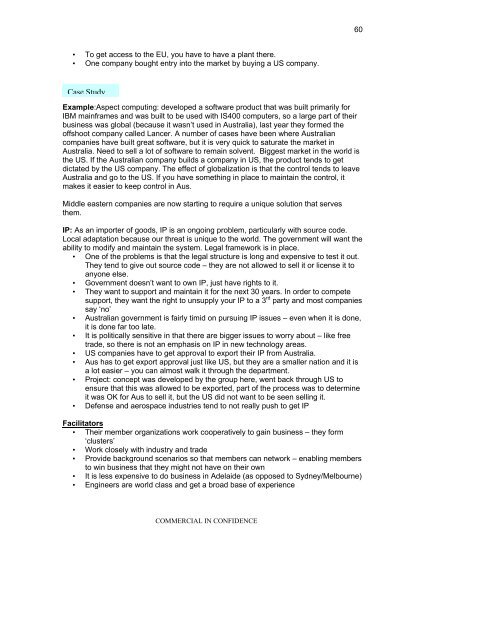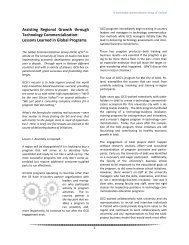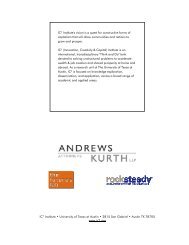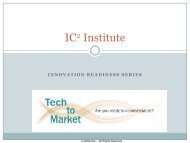“Quicklook” Assessment of Greater Adelaide's Assets & Challenges ...
“Quicklook” Assessment of Greater Adelaide's Assets & Challenges ...
“Quicklook” Assessment of Greater Adelaide's Assets & Challenges ...
Create successful ePaper yourself
Turn your PDF publications into a flip-book with our unique Google optimized e-Paper software.
• To get access to the EU, you have to have a plant there.<br />
• One company bought entry into the market by buying a US company.<br />
Case Study<br />
Example:Aspect computing: developed a s<strong>of</strong>tware product that was built primarily for<br />
IBM mainframes and was built to be used with IS400 computers, so a large part <strong>of</strong> their<br />
business was global (because it wasn’t used in Australia), last year they formed the<br />
<strong>of</strong>fshoot company called Lancer. A number <strong>of</strong> cases have been where Australian<br />
companies have built great s<strong>of</strong>tware, but it is very quick to saturate the market in<br />
Australia. Need to sell a lot <strong>of</strong> s<strong>of</strong>tware to remain solvent. Biggest market in the world is<br />
the US. If the Australian company builds a company in US, the product tends to get<br />
dictated by the US company. The effect <strong>of</strong> globalization is that the control tends to leave<br />
Australia and go to the US. If you have something in place to maintain the control, it<br />
makes it easier to keep control in Aus.<br />
Middle eastern companies are now starting to require a unique solution that serves<br />
them.<br />
IP: As an importer <strong>of</strong> goods, IP is an ongoing problem, particularly with source code.<br />
Local adaptation because our threat is unique to the world. The government will want the<br />
ability to modify and maintain the system. Legal framework is in place.<br />
• One <strong>of</strong> the problems is that the legal structure is long and expensive to test it out.<br />
They tend to give out source code – they are not allowed to sell it or license it to<br />
anyone else.<br />
• Government doesn’t want to own IP, just have rights to it.<br />
• They want to support and maintain it for the next 30 years. In order to compete<br />
support, they want the right to unsupply your IP to a 3 rd party and most companies<br />
say ‘no’<br />
• Australian government is fairly timid on pursuing IP issues – even when it is done,<br />
it is done far too late.<br />
• It is politically sensitive in that there are bigger issues to worry about – like free<br />
trade, so there is not an emphasis on IP in new technology areas.<br />
• US companies have to get approval to export their IP from Australia.<br />
• Aus has to get export approval just like US, but they are a smaller nation and it is<br />
a lot easier – you can almost walk it through the department.<br />
• Project: concept was developed by the group here, went back through US to<br />
ensure that this was allowed to be exported, part <strong>of</strong> the process was to determine<br />
it was OK for Aus to sell it, but the US did not want to be seen selling it.<br />
• Defense and aerospace industries tend to not really push to get IP<br />
Facilitators<br />
• Their member organizations work cooperatively to gain business – they form<br />
‘clusters’<br />
• Work closely with industry and trade<br />
• Provide background scenarios so that members can network – enabling members<br />
to win business that they might not have on their own<br />
• It is less expensive to do business in Adelaide (as opposed to Sydney/Melbourne)<br />
• Engineers are world class and get a broad base <strong>of</strong> experience<br />
COMMERCIAL IN CONFIDENCE<br />
60





